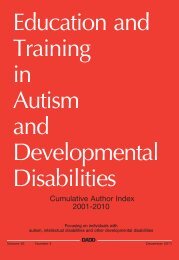Download the Journal (PDF) - Division on Autism and ...
Download the Journal (PDF) - Division on Autism and ...
Download the Journal (PDF) - Division on Autism and ...
Create successful ePaper yourself
Turn your PDF publications into a flip-book with our unique Google optimized e-Paper software.
TABLE 7<br />
Unprompted <strong>and</strong> Prompted Resp<strong>on</strong>ses by Element of a Story<br />
Participants<br />
Characters Setting Event Problem Soluti<strong>on</strong> Totals<br />
UP P UP P UP P UP P UP P UP P<br />
Cole 24 1 3 1 14 5 8 6 1 0 50 13 63<br />
Cole’s P’s 11 3 11 2 20 5 4 4 2 0 48 14 62<br />
Dean 4 1 5 0 18 8 6 5 0 1 33 15 48<br />
Dean’s P’s 1 0 2 1 15 4 15 5 1 1 34 11 45<br />
Nate 9 2 8 1 15 5 9 11 0 0 41 19 60<br />
Nate’s P’s 5 0 3 1 18 5 14 1 6 1 48 6 54<br />
<strong>and</strong> necessary for <str<strong>on</strong>g>the</str<strong>on</strong>g>ir child. Later, parents<br />
were shown a video of <str<strong>on</strong>g>the</str<strong>on</strong>g> first interventi<strong>on</strong><br />
sessi<strong>on</strong> followed by a video of <str<strong>on</strong>g>the</str<strong>on</strong>g> last sessi<strong>on</strong>,<br />
<strong>and</strong> were asked to describe any changes in<br />
<str<strong>on</strong>g>the</str<strong>on</strong>g>ir child’s reading <strong>and</strong> language skills. Children<br />
with ASD <strong>and</strong> <str<strong>on</strong>g>the</str<strong>on</strong>g>ir general educati<strong>on</strong><br />
peers were interviewed separately. Questi<strong>on</strong>s<br />
pertained to usefulness of <str<strong>on</strong>g>the</str<strong>on</strong>g> reading interventi<strong>on</strong>.<br />
Fur<str<strong>on</strong>g>the</str<strong>on</strong>g>r, children were asked about<br />
relati<strong>on</strong>ships established with <str<strong>on</strong>g>the</str<strong>on</strong>g>ir reading<br />
partners during interventi<strong>on</strong>.<br />
All participants with ASD stated <str<strong>on</strong>g>the</str<strong>on</strong>g> interventi<strong>on</strong><br />
helped <str<strong>on</strong>g>the</str<strong>on</strong>g>m underst<strong>and</strong> what <str<strong>on</strong>g>the</str<strong>on</strong>g>y<br />
read. Barry <strong>and</strong> Austin reported <str<strong>on</strong>g>the</str<strong>on</strong>g>y still ask<br />
questi<strong>on</strong>s when <str<strong>on</strong>g>the</str<strong>on</strong>g>y read. When asked what<br />
<str<strong>on</strong>g>the</str<strong>on</strong>g>y liked best about <str<strong>on</strong>g>the</str<strong>on</strong>g> interventi<strong>on</strong>, Austin<br />
focused <strong>on</strong> <str<strong>on</strong>g>the</str<strong>on</strong>g> books <strong>and</strong> reading with peers,<br />
Barry reported a preference for working with<br />
<strong>on</strong>e peer, <strong>and</strong> Chris enjoyed using <str<strong>on</strong>g>the</str<strong>on</strong>g> checklist.<br />
Austin described positive attributes of all<br />
three of his peers, <strong>and</strong> Barry favored <strong>on</strong>e peer<br />
he thought of as “cool.”<br />
All general educati<strong>on</strong> peers indicated <str<strong>on</strong>g>the</str<strong>on</strong>g><br />
interventi<strong>on</strong> was helpful, <strong>and</strong> <str<strong>on</strong>g>the</str<strong>on</strong>g>y enjoyed<br />
participating. General educati<strong>on</strong> participants<br />
stated <str<strong>on</strong>g>the</str<strong>on</strong>g>y learned new words (n 3) <strong>and</strong><br />
how to ask questi<strong>on</strong>s (n 3). Also, <strong>on</strong>e participant<br />
noted she was able to take time to<br />
read, ano<str<strong>on</strong>g>the</str<strong>on</strong>g>r menti<strong>on</strong>ed feeling encouraged<br />
to read more, <strong>and</strong> a third thought <str<strong>on</strong>g>the</str<strong>on</strong>g> book<br />
helped him learn. Fur<str<strong>on</strong>g>the</str<strong>on</strong>g>r, six participants<br />
reported <str<strong>on</strong>g>the</str<strong>on</strong>g>y c<strong>on</strong>tinued to ask questi<strong>on</strong>s<br />
when reading <strong>and</strong> reported <str<strong>on</strong>g>the</str<strong>on</strong>g>y talked to <str<strong>on</strong>g>the</str<strong>on</strong>g><br />
children with ASD more often. When asked<br />
what <str<strong>on</strong>g>the</str<strong>on</strong>g>y thought of <str<strong>on</strong>g>the</str<strong>on</strong>g>ir peers with ASD, all<br />
communicated differences in percepti<strong>on</strong>. For<br />
example, <strong>on</strong>e of Austin’s peers stated that before<br />
interventi<strong>on</strong> he found Austin “a little<br />
382 / Educati<strong>on</strong> <strong>and</strong> Training in Developmental Disabilities-September 2008<br />
Total #<br />
Posed<br />
weird,” but after interventi<strong>on</strong> he thought of<br />
Austin as “a good friend.” Similarly, <strong>on</strong>e of<br />
Chris’s peers believed Chris was “a nice pers<strong>on</strong>”<br />
prior to interventi<strong>on</strong>, <strong>and</strong> after she c<strong>on</strong>sidered<br />
him “nice” <strong>and</strong> “smart.” In fact she<br />
stated: “. . . he didn’t really need my help at all<br />
because he was really smart.” Overall, six of<br />
<str<strong>on</strong>g>the</str<strong>on</strong>g> seven peers would participate in <str<strong>on</strong>g>the</str<strong>on</strong>g> reading<br />
interventi<strong>on</strong> again, <strong>and</strong> <strong>on</strong>e indicated he<br />
might.<br />
Parents of children with ASD were shown a<br />
video of <str<strong>on</strong>g>the</str<strong>on</strong>g> first interventi<strong>on</strong> sessi<strong>on</strong> followed<br />
by a video of <str<strong>on</strong>g>the</str<strong>on</strong>g> last sessi<strong>on</strong> <strong>and</strong> were <str<strong>on</strong>g>the</str<strong>on</strong>g>n<br />
asked to describe any changes in her child’s<br />
reading <strong>and</strong> language skills from <str<strong>on</strong>g>the</str<strong>on</strong>g> first to<br />
last sessi<strong>on</strong>. Austin’s mo<str<strong>on</strong>g>the</str<strong>on</strong>g>r reported improvement<br />
in Austin’s questi<strong>on</strong> formati<strong>on</strong> <strong>and</strong><br />
attenti<strong>on</strong> while reading. Barry’s parents <strong>and</strong><br />
Chris’s mo<str<strong>on</strong>g>the</str<strong>on</strong>g>r acknowledged a positive gain<br />
in reading fluency including rate, accuracy<br />
<strong>and</strong>/or expressi<strong>on</strong>. Chris’s mo<str<strong>on</strong>g>the</str<strong>on</strong>g>r noted<br />
forming questi<strong>on</strong>s remained difficult for him<br />
<strong>and</strong> stated he had trouble “. . . coming up with<br />
words.” Austin’s mo<str<strong>on</strong>g>the</str<strong>on</strong>g>r <strong>and</strong> Barry’s parents<br />
observed a decrease in <str<strong>on</strong>g>the</str<strong>on</strong>g> level of prompting<br />
prior to <strong>and</strong> following interventi<strong>on</strong> while<br />
Chris’s mo<str<strong>on</strong>g>the</str<strong>on</strong>g>r noticed less prompting related<br />
to initiati<strong>on</strong> of a questi<strong>on</strong>.<br />
Overall, Austin <strong>and</strong> Chris’s mo<str<strong>on</strong>g>the</str<strong>on</strong>g>rs, as well<br />
as Barry’s parents, agreed that <str<strong>on</strong>g>the</str<strong>on</strong>g> interventi<strong>on</strong><br />
was valuable. Austin’s mo<str<strong>on</strong>g>the</str<strong>on</strong>g>r <strong>and</strong> Barry’s<br />
parents suggested <str<strong>on</strong>g>the</str<strong>on</strong>g> interventi<strong>on</strong> was important<br />
for both reading <strong>and</strong> language. Moreover,<br />
Barry’s parents indicated it improved<br />
Barry’s “c<strong>on</strong>versati<strong>on</strong>al skills.” Chris’s mo<str<strong>on</strong>g>the</str<strong>on</strong>g>r<br />
valued <str<strong>on</strong>g>the</str<strong>on</strong>g> interventi<strong>on</strong> because Chris no<br />
l<strong>on</strong>ger resp<strong>on</strong>ded to questi<strong>on</strong>s with “I d<strong>on</strong>’t<br />
know.” Fur<str<strong>on</strong>g>the</str<strong>on</strong>g>r, all interviewees would like
















